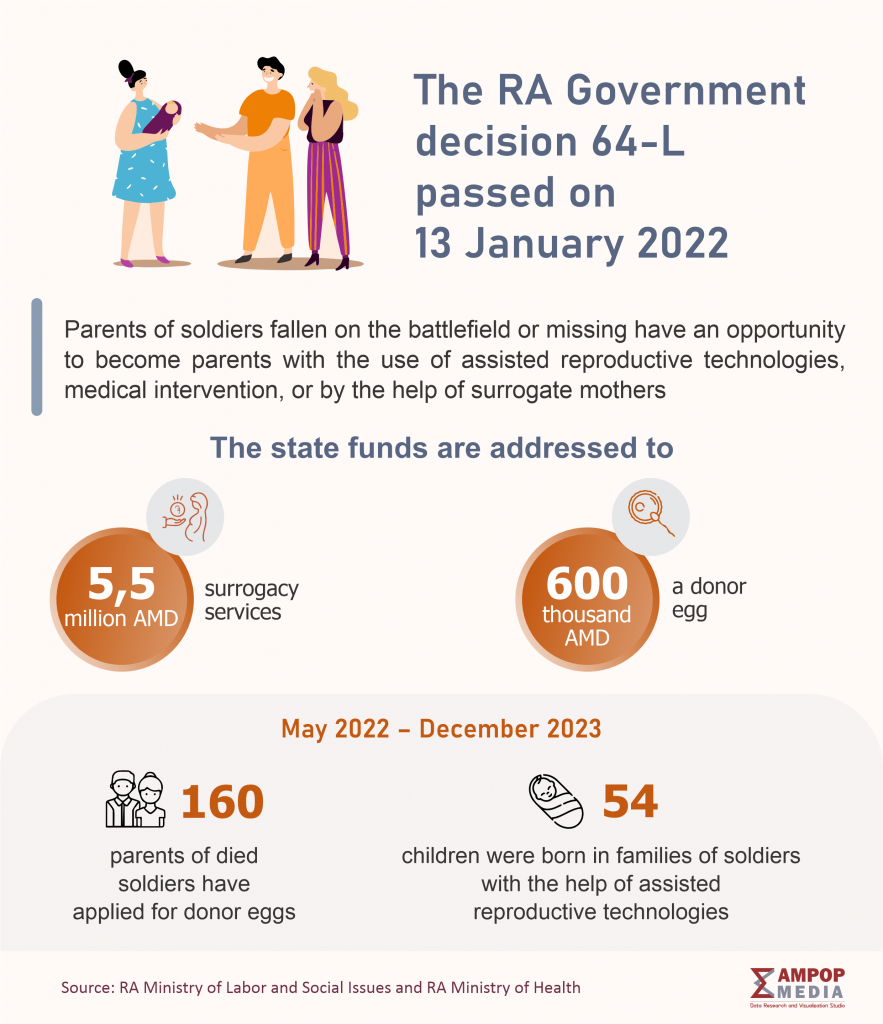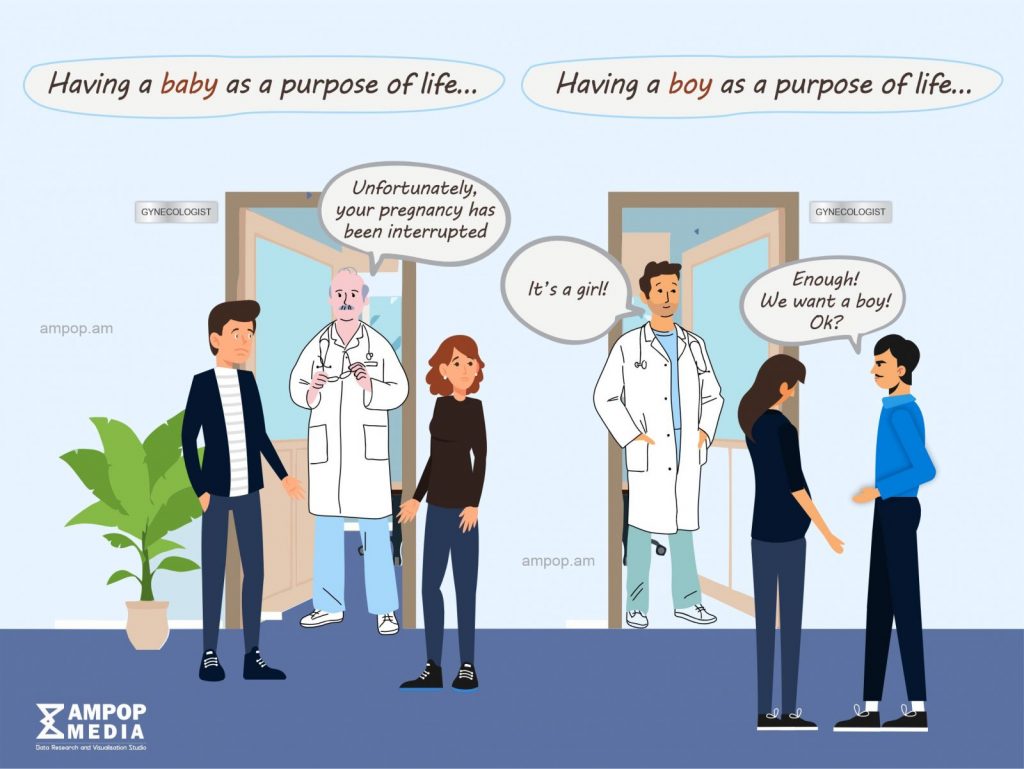Editor’s note: comprised of two parts, this publication is prepared in the memory of those boys and girls, whose lives have been interrupted by a decision of mature people. Here we combine seemingly unrelated issues: the problem of selective abortions and the one of increased demand for surrogacy, specifically, among the parents of the soldiers who fall in the recent wars.
This is an attempt to showcase the situation unfolding in our society, in which the natural course of things or, as the experts call it, the biological norm, is distorted. To embrace the topic, reporter Lilit Harutyunyan used statistical data and contacted dozens of sources, including surrogate mothers, women facing the problem of infertility, women who have opted for a selective abortion, as well as mothers of fallen soldiers, willing to become mothers again, which does not always prove possible due to natural reasons. Armenia is a country with a 15% infertility rate among its population. The World Health Organization says the figures shall raise concerns.
The second part of the story is available here.
Giving life
Luiza, 35, is among the surrogate mothers, who in December 2023 gave birth to a child into the family of a soldier who died during the 44-day war. Following a Caesarean section, Luiza is currently in a post-surgery recovery period.
This was Luiza’s first experience as a surrogate mother, and her second childbirth. She says the post-delivery comes at a price for her; she has had her daughter, now 13, by vaginal birth.
Luiza is a school teacher; her decision to become a surrogate mother was prompted by a need to buy an apartment of her own. Later, as she got acquainted with the family of the soldier, her attitude to the surrogacy changed, and she felt it was growing into a mission for her: “This was not an enterprise for money, it was rather a mission; the money I earned will be spent, but the blessings of the family will stay with my daughter and me,” Luiza shares; then says looking up: “I am grateful to the Lord for choosing me to bring a new life into this world.”
What is surrogacy?
Surrogacy is carrying of pregnancy and delivery of a baby by a woman for other persons, who will become the child’s parents following its birth, and is classified by the World Health Organization as an assisted reproductive technology.
The genetic material for the embryo (spermatozoids and eggs) are mostly taken from the persons willing to become parents, but those may also be provided by donors.
Surrogacy is applicable when pregnancy and labor are not recommended or are impossible from a medical perspective, also in the cases when pregnancy poses a serious threat to a woman’s health.
The first successful surrogacy case was registered in the US about 38 years ago, in 1986. The child born as a result of the attempt had no genetic connection to the mother.
Luiza says her mother-in-law has been among the first to support her decision. Luiza is a widow: her husband died in an accident 12 years ago.
“I explained to my daughter the child I was carrying was not going to be her brother,” the woman says.
She says she has already got a mortgage on an apartment and has paid most of the debt with the sum she earned as a surrogate mother. “I lit up their heart and got a roof over my head,” Luiza says.
Last August, another woman helped the family of Mher Grigoryan, a soldier fallen in the 44-day war, become parents again.
Little Mher’s birth has brought this family hope and a reason to live for again.
“He has breathed new life into us. So many things have changed, because we have a reason to wake up in the morning. I plead Lord to give me health to be able to raise him…,” says Nazik Grigoryan, little Mher’s mother.
She says she made attempts to get pregnant following the loss of her son, but left the tries after several unsuccessful ones and opted for the help of a surrogate mother.
“I saw women having babies with the help of surrogate mothers. I desperately needed my Mher reborn. I needed to call his name and get an answer. It took some time, though…,” Nazik recalls. In fact, it took the hospital about a year to find a right candidate for a surrogate mother to fulfill Nazik’s dream.

“Surrogate mothers give life to more than one person. I pray Lord blesses them for bringing hope to families like ours. The baby made us live again. We have been given life, too. We were near dead.”
Nazik underlines that the expenses for the surrogacy were paid by the state and says they have not faced any red tape with the documents.
The role of the Armenian Government
By a decision of the Armenian Government passed in January 2022 (64-L), the parents of soldiers fallen on the battlefield or missing have an opportunity to become parents with the use of assisted reproductive technologies, medical intervention, or by the help of surrogate mothers.
Armen Margaryan, the head of the department for social support to families at the administration of the Ministry of Labor and Social Issues of Armenia, says the decision was widely welcomed by the parents.
The maximum amount allotted for each surrogate mother set by the state makes up to AMD 5 500 000 [about USD 13 800], and about AMD 600 000 [about USD 1500] per each donor egg.
From May 2022 on, in the course of just 20 months since the program was launched, 160 parents of soldiers have applied for compensation for donor eggs; the state has so far spent about AMD 93 300 000 for that purpose.
Following the legislative amendments, starting from July 2023, the opportunities offered by the program have been expanded.
“Before, each family of a soldier would get a one-time compensation for donor egg; now, the compensation is envisioned for the second attempt, as well, since the first attempt may not always be successful,” Armen Margaryan says.
According to Lena Nanushyan, the Deputy Minister of Healthcare of Armenia, 54 babies have been born into the families of soldiers with the help of assisted reproductive technologies within the 20 months of the program implementation.
24 more families of soldiers have shown interest in the surrogacy services within the state financed program; the representative of the ministry says, however, there is a lack of women offering the service.
“We need surrogate mothers. Their number is less than the demand for them,” Armen Margaryan says to Ampop Media. He adds the reason behind the problem is sometimes the sum offered for the service; women ask more for surrogacy.
Who is eligible for surrogate motherhood?
Surrogacy services are offered both by medical institutions specializing in reproductive medicine, and individuals. In the latter case, doctors check the health of the potential candidate to ensure the latter meets the set criteria.
The Armenian legislation says women between 18 and 35 are eligible for surrogacy on a condition they undergo required medical check-ups and have proven lack of any contraindications for surrogacy.
However, a surrogate mother cannot be an egg donor, i.e. the woman providing surrogacy services is prohibited from being a biological mother at the same time.
A surrogate mother cannot be a biological mother
The relationships between the persons using assisted reproductive technologies and surrogate mothers are regulated by written agreements, which are subject to notary certification.
A surrogate mother is required to register for regular check-ups at the early stage of pregnancy (before the 12 weeks of pregnancy), to remain under doctor’s care, to strictly follow the medical prescriptions, and to keep one’s health in check.
The prices of the service

Gynecologist and reproductologist Lilit Karapetyan confirms the words of the ministry representative, saying people are lining up for surrogate mothers, including those, who are not included in the state program.
Finding a woman for surrogacy has become a complicated task, since the demand has increased and women tend to increase the requested price for the service.
It takes a long path for the families, who undergo all sorts of treatments, make attempts with extracorporeal fertilization, etc., before turning to surrogacy.
We contacted several sources to check the rates of the surrogacy services. According to our inquiry, the prices for surrogacy services range between USD 15 000 and USD 20 000; to note, these prices do not include the expenses arising during the pregnancy, including those for the required medical tests and check-ups, which are fully covered by the future parents.
Karapetyan says the number of women willing to become surrogate mothers has increased, too, but making the choice still remains tough, because the requirements are strict: a woman is expected to be under 35, show integrity, have at least one child of her own and have no health issues. “That is, only one out of ten may prove eligible.”
Lilit Karapetyan says women willing to provide the services mostly come from socially vulnerable and needy groups.
When gender does not matter; and having a baby is an ultimate goal
A 37-year-old source to Ampop Media, who preferred to remain anonymous, is trying to have a baby with the help of a surrogate mother. She says her body rejects the embryo at early stages of pregnancy due to health issues.
The woman has been trying to become a mother with the help of a surrogate starting from 2022. Currently, she is dealing with the second candidate of a surrogate mother for her future child: “My husband and I, we earn enough to afford ourselves the service, yet, both attempts with our first candidate failed.”
The woman says she found a surrogate mother with the help of an individual entrepreneur. The first candidate requested USD 15 000, and additionally AMD 150 000 monthly salary; the second one has requested USD 16 000, and additionally AMD 150 000 monthly salary. The client is supposed to also cover all the expenses for health tests. The sums grow in the case of twin pregnancy.
Ampop Media’s source also underlines the year by year increase in the demand for surrogate mothers, believing that is the reason that drives the prices up.
The woman recalls their previous candidate was a lonely mother; the current one is a married woman, whose husband had been against the deal, but had succumbed to the arguments of his wife and at the perspective of getting a chance to purchase an apartment with the earned sum.
Another woman, 44, who also asked her name to be undisclosed, shared with Ampop Media her long journey of 16 years, in which her family has had nine unsuccessful attempts of extracorporeal fertilization, and is preparing for their tenth attempt.
“Through all these years, all the earnings have been steered to medical expenses with no result whatsoever… We managed to buy a coach just a couple of days ago for our home and I broke into tears seeing it delivered… The coach is one rare thing we have afforded ourselves for our home. Can you imagine that?!” the woman shares.
She says they have also had two unsuccessful attempts of adopting a newborn baby, but both times the preference was given to another family.
The family is also thinking about the possibility to find a surrogate mother, but the anticipated significant expenses and the psychological barriers still keep them back from making a final decision.
“We will have to pawn the apartment that we have, and you know how hard it is to get a home in our days; and then, we will need more than USD 15-20 000, because there are still expenses for the donor egg, tests, and many other expenses…”
Pregnancy as a means to make a living
Extracorporeal fertilization practices in Armenia were first introduced by the Research Center of Maternal and Child Health Protection and were first done in 2004, with a triplet born in the result of applying the technology.
The first birth with the help of surrogacy in Armenia was registered in 2006 at the same research center; a woman gave birth to a child for her brother’s family. There have been cases when a mother has given birth to a child for her own daughter.
There have been cases, when a mother has given birth to a child for her own daughter.

Armenian legislation lets surrogacy for both commercial and humanitarian purposes. Armine Sayadyan, gynecologist and reproductologist at the research center, told in a conversation with Ampop Media that in the majority of the cases, though, women think of becoming a surrogate mother out of financial need.
“Those are mostly women who are in search of job and need money. We have long conversations with them, I would rather say, we play the role of a psychologist, because not all those who apply fully understand the seriousness and the essence of the job.”
Sayadyan says in most of the cases the surrogate mothers prove integrity in performing their responsibilities and form warm human bonds with the families. In the majority of cases, surrogate mothers live in their own homes, although there are cases when in the later periods of pregnancy these women express willingness to distance from their surroundings to keep the privacy. There are cases when clients insist on hosting the surrogate mother in their own homes throughout the period of pregnancy.
Armine Sayadyan says, the demand for surrogates increases yearly and the families seeking surrogates spend a lot of time to find a proper candidate: “There are also applications from our compatriots abroad, because some countries ban surrogacy motherhood.”
Surrogacy is totally banned in France, Germany, Austria, Norway, Sweden, and some of the states in the US. In some countries, only non-commercial surrogacy is allowed.
As many families struggle to have children are ready to pay significant sums for that, search surrogate mother and hope for the best, there are families that interrupt healthy pregnancies, refusing to have baby girls.
Read the second part of the story here.
By Lilit Harutyunyan
Illustrations and infographics by Anush Baghdasaryan
Photo credits from the personal archives of sources
Project by Suren Deheryan
The following publications were produced as part of the project Online journalism, in-depth, which is funded by the German Federal Ministry for Economic Cooperation and Development (BMZ). The views expressed in these publications are those of the independent authors and do not necessarily reflect those of the BMZ.
© All the stories, infographics and other visuals bearing the Ampop Media logo is possible to publish on other audiovisual platforms only in case of an agreement reached with Ampop Media and/or JFF.
Փորձագետի կարծիք
First Published: 29/01/2024












